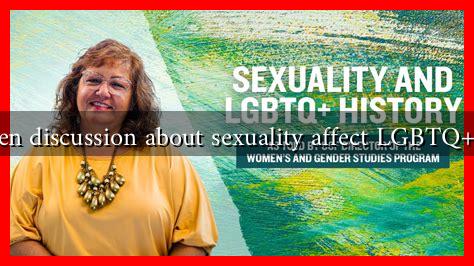-
Table of Contents
How Does Open Discussion About Sexuality Affect LGBTQ+ Communities?
Open discussions about sexuality play a crucial role in shaping the experiences and well-being of LGBTQ+ communities. By fostering an environment where individuals can express their identities and experiences without fear of judgment, these conversations can lead to greater acceptance, understanding, and support. This article explores the impact of open discussions about sexuality on LGBTQ+ communities, highlighting the benefits, challenges, and real-world implications.
The Importance of Open Dialogue
Open dialogue about sexuality is essential for several reasons:
- Promotes Acceptance: When discussions about sexuality are normalized, it helps reduce stigma and discrimination against LGBTQ+ individuals.
- Encourages Self-Expression: Open conversations allow individuals to express their identities freely, fostering a sense of belonging and community.
- Informs and Educates: These discussions can educate both LGBTQ+ individuals and the broader community about diverse sexual orientations and gender identities.
- Supports Mental Health: Open discussions can alleviate feelings of isolation and anxiety, contributing to better mental health outcomes.
Case Studies: The Impact of Open Discussions
Several case studies illustrate the positive effects of open discussions about sexuality within LGBTQ+ communities:
- The Trevor Project: This organization provides crisis intervention and suicide prevention services to LGBTQ+ youth. Their research indicates that LGBTQ+ youth who engage in open discussions about their sexuality are less likely to experience suicidal thoughts and behaviors.
- GLAAD’s “Accelerating Acceptance” Report: GLAAD’s annual report shows that increased visibility and open discussions about LGBTQ+ issues correlate with higher levels of acceptance among the general population. For instance, in 2021, 53% of non-LGBTQ+ respondents reported knowing someone who identifies as LGBTQ+, a significant increase from previous years.
Challenges to Open Discussion
Despite the benefits, there are challenges to fostering open discussions about sexuality:
- Societal Stigma: Many individuals still face societal stigma and discrimination, which can deter them from engaging in open discussions.
- Fear of Repercussions: Concerns about backlash from family, friends, or employers can prevent individuals from expressing their true selves.
- Lack of Safe Spaces: Not all communities provide safe environments for open discussions, which can hinder dialogue and support.
Statistics Highlighting the Need for Open Discussion
Statistics underscore the importance of open discussions about sexuality:
- According to a 2020 report by the Human Rights Campaign, 46% of LGBTQ+ youth reported feeling sad or hopeless, compared to 29% of their non-LGBTQ+ peers.
- The same report found that 70% of LGBTQ+ youth said they wanted to talk about their sexual orientation or gender identity but felt they could not.
Creating Safe Spaces for Dialogue
To foster open discussions about sexuality, it is essential to create safe spaces where individuals feel comfortable sharing their experiences. Here are some strategies:
- Education and Training: Providing training for educators, employers, and community leaders on LGBTQ+ issues can help create more inclusive environments.
- Support Groups: Establishing support groups for LGBTQ+ individuals can provide a platform for open dialogue and shared experiences.
- Community Events: Hosting events that celebrate LGBTQ+ identities can encourage open discussions and promote visibility.
Conclusion
Open discussions about sexuality are vital for the well-being of LGBTQ+ communities. They promote acceptance, encourage self-expression, and support mental health. While challenges remain, the positive impact of these conversations is evident through various case studies and statistics. By creating safe spaces for dialogue and fostering an environment of understanding, we can continue to support LGBTQ+ individuals in their journey toward acceptance and self-identity. As society progresses, it is crucial to keep the conversation going, ensuring that every voice is heard and valued.
For more information on supporting LGBTQ+ communities, visit Human Rights Campaign.


